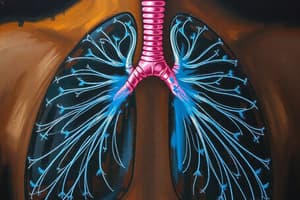Podcast
Questions and Answers
A patient with asthma is prescribed both salmeterol and a beta-blocker. What is the primary concern with this combination?
A patient with asthma is prescribed both salmeterol and a beta-blocker. What is the primary concern with this combination?
- Reduced effectiveness of salmeterol. (correct)
- Increased bitter taste in the mouth.
- Increased risk of paradoxical bronchospasm.
- Elevated theophylline levels.
A COPD patient is prescribed ipratropium. What is the MOST important instruction to provide regarding its administration relative to other inhaled medications?
A COPD patient is prescribed ipratropium. What is the MOST important instruction to provide regarding its administration relative to other inhaled medications?
- Administer ipratropium immediately after other inhalers to enhance their effects.
- Administer ipratropium only as needed (PRN) for acute symptoms.
- Administer ipratropium 5 minutes before inhaled steroids. (correct)
- Administer ipratropium first to open airways for better absorption of other drugs.
A patient taking an SSRI reports experiencing several adverse effects shortly after starting the medication. Which of the following adverse effects requires immediate medical attention?
A patient taking an SSRI reports experiencing several adverse effects shortly after starting the medication. Which of the following adverse effects requires immediate medical attention?
- Insomnia
- Bitter taste in mouth
- Mild sexual dysfunction.
- Onset of manic symptoms. (correct)
A patient taking an SSRI is also prescribed an anticoagulant. What potential interaction should the healthcare provider monitor for?
A patient taking an SSRI is also prescribed an anticoagulant. What potential interaction should the healthcare provider monitor for?
A patient is prescribed a tricyclic antidepressant (TCA). Considering the potential adverse effects, what specific monitoring is MOST critical?
A patient is prescribed a tricyclic antidepressant (TCA). Considering the potential adverse effects, what specific monitoring is MOST critical?
A patient with chronic asthma is prescribed both zafirlukast and theophylline. Which potential interaction should the nurse monitor for?
A patient with chronic asthma is prescribed both zafirlukast and theophylline. Which potential interaction should the nurse monitor for?
A patient is prescribed an inhaled corticosteroid after transitioning from oral corticosteroids. What critical instruction should the nurse provide regarding potential risks?
A patient is prescribed an inhaled corticosteroid after transitioning from oral corticosteroids. What critical instruction should the nurse provide regarding potential risks?
A patient with COPD is prescribed both a SABA for acute symptoms and a long-acting anticholinergic. What is the primary reason for including the long-acting anticholinergic in this treatment plan?
A patient with COPD is prescribed both a SABA for acute symptoms and a long-acting anticholinergic. What is the primary reason for including the long-acting anticholinergic in this treatment plan?
A patient taking theophylline reports increased anxiety and insomnia. What lifestyle factor should the nurse assess first in relation to these symptoms?
A patient taking theophylline reports increased anxiety and insomnia. What lifestyle factor should the nurse assess first in relation to these symptoms?
A patient who smokes is prescribed theophylline for COPD. How does smoking impact the theophylline dosage?
A patient who smokes is prescribed theophylline for COPD. How does smoking impact the theophylline dosage?
Flashcards
Bronchodilators
Bronchodilators
Medications that relax the muscles in the lungs and widen the airways, making breathing easier.
Anti-inflammatory Agents
Anti-inflammatory Agents
Reduce the amount of inflammation in the airways.
Inhaled Corticosteroid
Inhaled Corticosteroid
A type of inhaled corticosteroid that reduces inflammation in the airways.
SABA (Short-Acting Beta Agonist)
SABA (Short-Acting Beta Agonist)
Signup and view all the flashcards
Methylxanthines (Theophylline)
Methylxanthines (Theophylline)
Signup and view all the flashcards
Chromolyn
Chromolyn
Signup and view all the flashcards
Salmeterol
Salmeterol
Signup and view all the flashcards
Ipratropium
Ipratropium
Signup and view all the flashcards
Selective Serotonin Reuptake Inhibitors (SSRIs)
Selective Serotonin Reuptake Inhibitors (SSRIs)
Signup and view all the flashcards
Tricyclic Antidepressants (TCAs)
Tricyclic Antidepressants (TCAs)
Signup and view all the flashcards
Study Notes
- Medications for respiratory and mental health
Bronchodilators
- Adrenergics
- Anticholinergics
- Methylxanthines
Glucocorticoids
- Can be administered orally or through inhalation
Anti-inflammatory Agents
- Inhaled corticosteroids
- Leukotriene
- Mast Cells
Inhaled Corticosteroid
- Includes pulmicort and Flunisolide-AeroBid as prototypes
- Patients transitioning from oral to inhaled corticosteroids have an increased risk of adrenal insufficiency, especially if they experience trauma, surgery, or infections, particularly gastroenteritis.
Leukotriene
- Zafirlukat (Accolate) is a prototype
- Singular
- Used as a prophylactic and for anti-inflammatory purposes
- Not recommended for acute asthma attacks
- Suitable for chronic asthma management
- Interacts with theophylline, potentially increasing its drug level
LABA (Long-Acting Beta Agonist)
- Salmeterol
- Not intended for abortive therapy as it is long-acting
Antihistamines
- First-generation antihistamine: Benadryl is used for sleep, motion sickness, and as an antiemetic
- Contraindicated if the patient has glaucoma
- Anticholinergic effects
Second-Generation Antihistamines
- Loratadine is taken once daily on an empty stomach
- Absorption is affected by apple, grapefruit, and orange juice, as well as rifampin
- Allegra
SABA (Short-Acting Beta Agonist)
- Albuterol
- Used for acute asthma attacks
- Frequent use (more than 2-3 times per week) indicates poor asthma control
- Overuse can lead to rebound bronchoconstriction
Methylxanthines
- Theophylline has a narrow therapeutic range (5-15) requiring close monitoring
- No antidote for toxicity
- Toxicity signs at 20mcg, seizures at 30mcg, hyperglycemia, hypotension, brain damage
- Requires diet, OTC drugs, smoking habits, and adherence to be screened if levels decrease
- Tobacco increases theophylline's half-life by 50%; smoking may necessitate increased theophylline dosage
- Caffeine, including from OTC drugs, can increase theophylline levels
- Decreases the effects of lithium
Stages of COPD Treatment and Guidelines
- SABA PRN to manage acute episodes
- SABA plus long-acting anticholinergic (ipratropium); use bronchodilator and consider theophylline for breakthrough symptoms
- Add inhaled steroid (Pulmocort)
- Administer oxygen
- Inhaled steroids decrease frequency of exacerbation
Mast Cell Stabilizers
- Cromolyn used as a prophylactic anti-inflammatory agent, not a bronchodilator
- May cause a bitter taste in the mouth after administration
Salmeterol
- Long-acting bronchodilator
- Contraindicated with beta-blockers
- Serevent Diskus brand
- Used for chronic maintenance of asthma and COPD
- Not for PRN use
- Do not administer more than twice a day
Ipratropium
- Anticholinergic, long-acting anticholinergic (Atrovent)
- First-line treatment for COPD
- Prescribed either orally or nasally
- Administer last after other inhalers and 5 minutes before steroids
- Not first choice in acute situations due to its long-acting properties
- May cause paradoxical bronchospasm with a newly opened MDI
- MDI: use 2 sprays before use
Antidepressants: SSRIs
- Indicated for depression and are considered first-line treatment
- Examples include fluoxetine, sertraline, paroxetine, citalopram, escitalopram, and fluvoxamine
- Adverse effects: sexual dysfunction, mania
- Serotonin syndrome may develop within 6-8 hours of initiation or increasing the dose
- Contraindicated for clients taking MAOIs; wait five weeks after discontinuation before starting an SSRI
- Administer with caution for clients taking anticoagulants due to protein binding
- Avoid breastfeeding
Tricyclic Antidepressants
- Taken once daily
- Examples include Imipramine (Tofranil), Desipramine (Norpramin), Amitriptyline, Doxipine, and Nortriptyline (Pamelor)
- Indicated for eating disorders and insomnia
- Adverse effects: cardiac conduction disorders
- Monitor drug levels
Studying That Suits You
Use AI to generate personalized quizzes and flashcards to suit your learning preferences.




